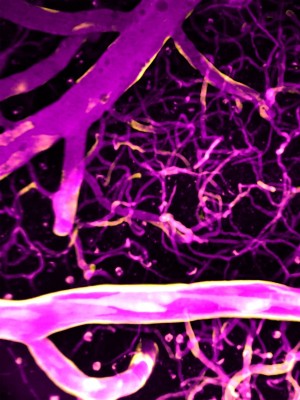September 25, 2019

Tracy L. Bale, PhD, Professor of Pharmacology and Director of the Center for Epigentic Research in Child Health & Brain Development has been elected President of the International Brain Research Organization.
IBRO is the global federation of neuroscience organizations established in 1961 that aims to promote and support neuroscience around the world through training, teaching, research, outreach and engagement activities, and the publication of our two journals, Neuroscience and IBRO Reports. More than 90 international, regional and national scientific organizations constitute IBRO’s Governing Council which, together with the IBRO Executive Committee and five Regional Committees, address the needs and advance the work of individual scientists and research communities everywhere.
In addition, IBRO has partnerships with like-minded scientific societies and organizations to identify priorities and help bridge gaps in knowledge, investment and resources in the field of brain research.
The IBRO Mission is to:
- develop, support, coordinate and promote scientific research in all fields concerning the brain
- promote international collaboration and exchange of scientific information on brain research throughout the world
- provide for and assist in education and dissemination of information relating to brain research
"IBRO’s mission to foster neuroscience research throughout the world is admirable. But it is also a challenging opportunity as the global landscape continues to shift. How IBRO positions itself to remain focused on action items and pushing its mission will determine the neuroscience community’s broad success," said Dr. Bale.
"The President of IBRO is the face of this force, and it is my passion to ensure that all available funding, training, education and resources that are critical toward this mission make it into the international communities in need, and that the developing neuroscience programs largely being driven forward by existing and new initiatives receive the mentorship and guidance to ensure their success," added Dr. Bale.
Contact
Office of Public Affairs
655 West Baltimore Street
Bressler Research Building 14-002
Baltimore, Maryland 21201-1559
Contact Media Relations
(410) 706-5260
Related stories

Wednesday, April 02, 2025
Researchers Reveal Key Brain Differences to Explain Why Ritalin Helps Improve Focus in Some More Than Others
Nearly 16 million American adults have been diagnosed with attention deficit hyperactivity disorder (ADHD), but evidence suggests that more than 30 percent of them don’t respond well to stimulant medications like Ritalin and Adderall. A new clinical trial provides a surprising explanation for why this may be the case: There are individual differences in how our brains circuits are wired, including the chemical circuits responsible for memory and concentration, according to a new study co-led by the University of Maryland School of Medicine (UMSOM) and performed at the National Institutes of Health (NIH) Clinical Center.

Tuesday, April 25, 2023
Immune System Sculpts Rat Brains During Development
Researchers have established that biological sex plays a role in determining an individual’s risk of brain disorders. For example, boys are more likely to be diagnosed with behavioral conditions like autism or attention deficit disorder, whereas women are more likely to suffer from anxiety disorders, depression, or migraines. However, experts do not fully understand how sex contributes to brain development, particularly in the context of these diseases. They think, in part, it may have something to do with the differing sizes of certain brain regions.

Friday, March 31, 2023
Traumatic Brain Injury Interferes with Immune System Cells’ Recycling Process in Brain Cells
Each year about 1.5 million people in the U.S. survive a traumatic brain injury due to a fall, car accident, or a sports injury, which can cause immediate and long-term disability.

Friday, January 06, 2023
UM School of Medicine Scientists Create First Extensive Brain Cell Data Repository
Neuroscience researchers now have access to 50 million brain cells to better understand how the brain develops and functions or changes with disease or trauma. Last month, scientists at the University of Maryland School of Medicine’s (UMSOM) Institute for Genome Sciences (IGS) unveiled a “one-stop shop” for brain cell data called the Neuroscience Multi-Omic Archive (NeMO Archive). This archive is now available to neuroscience researchers to transform their understanding of the complex workings of the brain.

Monday, November 14, 2022
Brain Area Thought to Impart Consciousness, Behaves Instead Like an Internet Router
Tucked underneath the brain’s outer, wrinkly cortex is a deeply mysterious area, known as the claustrum. This region has long been known to exchange signals with much of the cortex, which is responsible for higher reasoning and complex thought. Because of the claustrum’s extensive connections, the legendary scientist Francis Crick, PhD, of DNA-discovery fame, first postulated in 2005 that the claustrum is the seat of consciousness. In other words, the region of the brain enabling awareness of the world and ourselves.

Wednesday, July 21, 2021
University of Maryland School of Medicine Study Finds Calcium Precisely Directs Blood Flow in the Brain
University of Maryland School of Medicine and University of Vermont researchers have shown how the brain communicates to blood vessels when in need of energy, and how these blood vessels respond by relaxing or constricting to direct blood flow to specific brain regions.

Monday, April 29, 2019
UMSOM’s Reading on the Brain Program Teaches Baltimore City Elementary Students About the Brain-Building Power of Reading
Acting Baltimore City Mayor Jack Young joined 4th and 5th grade students at Callaway Elementary School to help paint a mural about the brain. It was all part of Reading on the Brain, a University of Maryland School of Medicine (UMSOM) program to teach young students about the importance of reading and how reading can stimulate brain development and inspire future success. Tracy Bale, PhD, is leading the pilot program, which also emphasizes science and helps children to understand how the brain works.

Thursday, March 28, 2019
Allergic Reactions Play Role in Sexual Behavior Development in Unborn Males and Females, UMSOM Research Shows
Researchers at the University of Maryland School of Medicine and colleagues at Ohio State University have discovered that allergic reactions trigger changes in brain behavior development in unborn males and females. This latest brain development discovery will ultimately help researchers better understand how neurological conditions can differ between men and women.

Friday, March 01, 2019
UMSOM Researchers Discover Clues to Brain Differences Between Males and Females
Researchers at the University of Maryland School of Medicine have discovered a mechanism for how androgens -- male sex steroids -- sculpt brain development. The research, conducted by Margaret M. McCarthy, Ph.D., Professor of Pharmacology and Chair of the Department of Pharmacology, could ultimately help researchers understand behavioral development differences between males and females.

Thursday, December 07, 2017
University of Maryland School of Medicine Scientists Identify the First Brain Cells to Respond to Sound
Some expectant parents play classical music for their unborn babies, hoping to boost their children’s cognitive capacity. While some research supports a link between prenatal sound exposure and improved brain function, scientists had not identified any structures responsible for this link in the developing brain.
